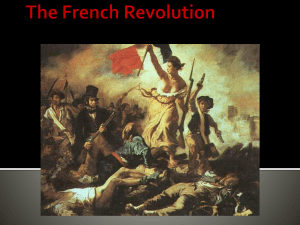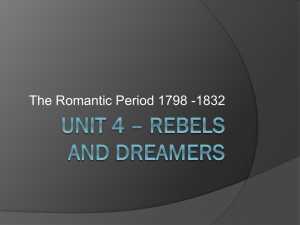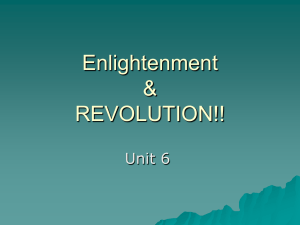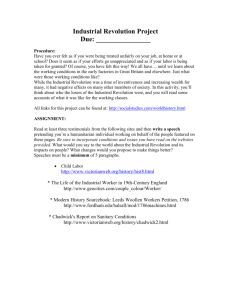File - Ms. Griffin
advertisement
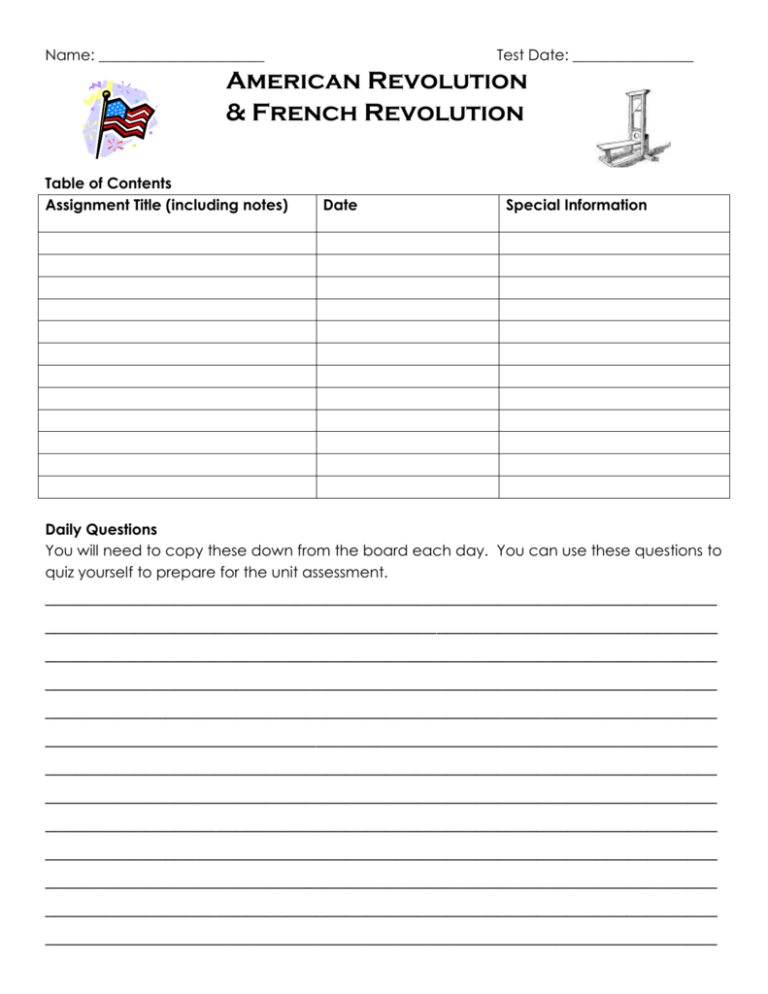
Name: ______________________ Test Date: ________________ American Revolution & French Revolution Table of Contents Assignment Title (including notes) Date Special Information Daily Questions You will need to copy these down from the board each day. You can use these questions to quiz yourself to prepare for the unit assessment. ___________________________________________________________________ ___________________________________________________________________ ___________________________________________________________________ ___________________________________________________________________ ___________________________________________________________________ ___________________________________________________________________ ___________________________________________________________________ ___________________________________________________________________ ___________________________________________________________________ ___________________________________________________________________ ___________________________________________________________________ ___________________________________________________________________ ___________________________________________________________________ Support Information 7-2.5 Explain how the Enlightenment influenced the American and French revolutions leading to the formation of limited forms of government, including the relationship between people and their government, the role of constitutions, the characteristics of shared powers, the protection of individual rights, and the promotion of the common good. The American Revolution was inspired by the Enlightenment, and the French Revolution, in turn, was inspired by the Enlightenment as well as the success of the American Revolution. These two revolutions, utilizing the ideas of the Enlightenment, led to the formation of limited governments and served as models for future limited governments and constitutions around the world. The Enlightenment presented new beliefs about authority and the role of the individual in government. John Locke presented ideas of natural rights of life, liberty, and property, and he declared that it is the purpose of governments to protect these rights. Furthermore, he stated that if a government fails to protect these rights, it is the right of the people to overthrow the government. The ideas of Montesquieu, Rousseau, and Voltaire can also be seen in the formation of limited forms of government. Based on these Enlightenment ideas, many of these limited governments became representative democracies where the citizens choose other citizens to represent them in the decision-making processes of government. These Enlightenment ideas inspired the leaders of the American Revolution, and the ideals and success of the American Revolution served as a model for the French and many other revolutions that followed such as those in Latin America. The American Revolution drew upon Locke’s beliefs in the Declaration of Independence. Thomas Jefferson made specific references to Locke’s ideas to argue that the colonists were rebelling because their rights had been violated and that they therefore had the right to alter or abolish their government. After gaining independence, the writers of the United States Constitution used Enlightenment ideas to provide the framework for their new, limited government. The American Revolution demonstrated that it was plausible for Enlightenment ideas about how a government should be organized to actually be put into practice. Some American diplomats, like Benjamin Franklin and Thomas Jefferson, had lived in Paris where they consorted freely with members of the French intellectual class. A growing number of French citizens had absorbed the ideas of "equality" and "freedom of the individual" as presented by Voltaire and other Enlightenment philosophers. Furthermore, contact between American revolutionaries and the French troops who supported them in the American Revolution helped spread revolutionary ideals to the French people. After the American Revolution, many French citizens began to attack the undemocratic nature of their own government, leading to the French Revolution (7-3.1). Following these revolutions, the ideas of the Enlightenment were used to develop limited governments and constitutions. A constitution that creates a limited government as the relationship between the people and their government embodies Locke’s idea of a social contract, as a constitution is an agreement between the government and the people. According to this agreement, the role of constitutions is to place limits on the government’s power by specifically outlining what powers the government does or does not have, or what the government can or cannot do. Therefore, by specifying these powers, the government cannot be unlimited or possess all the power. A constitution is the “law”which establishes the structure and operation of government and details the relationship of the people to their government. Constitutions are critical because they provide the government legitimacy in ruling. While constitutions can and do address many issues, they generally have provisions pertaining to several key components: they provide the framework for the operation of the legislative, executive, and judicial branches; they establish the relationship between the national government and the regional/provincial governments; and they define the relationship of government to the citizens and the rights of citizens. The characteristics of shared powers are evident in the creation of the three branches: executive, judicial, and legislative. These three branches clearly take influence from Montesquieu’s idea of separation of powers. The concept of shared powers is also established by the system of federalism as duties are divided between the federal and state governments. The protection of individual rights is established by the Bill of Rights, which takes influence from Locke’s idea of natural rights and also includes some of Voltaire’s rights. To promote the common good of the nation, and not just a ruler or the government, the Constitution requires citizen responsibility in electing representatives as well as in becoming representatives. Citizens are held accountable to one another through the guidelines of the Constitution, and this promotion of the common good displays influences from Rousseau’s idea of a nation having to do what is best for the majority or ruling by general will. This concept is also known as popular sovereignty. 7-3.1 Explain the causes, key events, and outcomes of the French Revolution, including the storming of the Bastille, the Reign of Terror, and Napoleon’s rise to power. The French Revolution was inspired by the Enlightenment and the American Revolution (7-2.5) and was caused by a series of events that together irreversibly changed the organization of political power, the nature of society, and the exercise of individual freedoms. The French Revolution was caused, in part, by the social imbalance of the Old Regime. Under this system, France was divided into three social classes: the First, Second, and Third Estates. The First Estate was the Roman Catholic clergy, who owned fifteen percent of the land and were one percent of the population. The Second Estate, the nobility, was two percent of the population and owned up to twenty-five percent of the land. The rest of the population, the Third Estate; which included lawyers, craftsmen, merchants, and peasants paid the majority of the taxes on the remainder while being underrepresented in government. The French Revolution also was caused by King Louis XVI, who was a weak and extravagant leader in a time of crisis. He had incurred great debts caused by war, including the French alliance in the American Revolution, and his own spending. His people were already highly taxed, and banks refused to loan him any more money. This required him to call together the Estates-General, the French legislative body. After the calling of the Estates-General, the Third Estate insisted on a new power structure that would allow every male citizen a vote instead of each Estate collectively having one vote. This change would guarantee them greater representation in the Estates-General. When their request was denied, they seceded and formed the National Assembly, symbolizing an end to absolute monarchy and the start of representative government in France. When shut out of the proceedings of the Estates General a few days later, the Third Estate gathered on the king’s tennis courts to write a new constitution for the government, called the Tennis Court Oath. Shortly thereafter, on July 14, 1789, a mob of peasants stormed the Bastille, a prison and armory. The peasants got weapons from the Bastille and then tore the Bastille down as it was a symbol of the King’s power. This event represented the beginning of the revolution and July 14 known as Bastille Day, is a national holiday in France. Riots then broke out across the countryside as peasants began raiding the homes of nobles, killing and looting in response to their anger at the unfair Estate System and their increased poverty. In 1791, a constitutional monarchy was established, significantly weakening the power of the king and granting power to the people in the form of the Legislative Assembly. The revolution became increasingly radical in nature. In late 1791, the Constitution was set aside, the king imprisoned, and the legislature took over in the form of the National Convention. The Convention declared France a republic based on universal male suffrage. The Convention initiated a military draft to raise an army to protect the revolution from the armies of other European monarchs and instituted the guillotine as a way of protecting the revolution from “enemies” within France. Many of the Convention were members of the Jacobins, a radical revolutionary group. From this group, Maximilien Robespierre gained increased power until he became the leader of the Committee of Public Safety in mid-1793. Robespierre gained power as a dictator and began the Reign of Terror in France. During the Reign of Terror, violence escalated with the mass execution by guillotine of 25,000-40,000 citizens deemed “enemies of the Revolution.” Most of those executed were nobles as well as the king and queen. Determining that Robespierre was too radical and fearing for their own lives, members of the National Convention executed Robespierre in July of 1794. After the execution of Robespierre, the revolution took a more conservative turn. From 1795 to 1799, France was ruled by five moderate men known as the Directory. During this time, Napoleon Bonaparte was making a name for himself in the French army. When the Directory lost favor in France in 1799, Bonaparte staged a coup d’état and took the title of First Consul. As ruler of a country that had been unstable for nearly ten years, Napoleon established a national banking system, set up an efficient taxation system, and ended government corruption. He restored the position of the Catholic Church in France, gaining the favor of the people and of the Pope. He also wrote a uniform system of laws known as the Napoleonic Code. In 1804, with the support of the people, Napoleon crowned himself emperor. Napoleon began his quest for a European empire and by 1812 controlled most of Europe. Unit Vocabulary Create a vocabulary chart, on your own paper, like the one shown below. Add each of the words listed below to your chart. Vocabulary Word Definition Drawing for the word 1. Bill of Rights 2. Constitution 3. Declaration of Independence 4. revolution 5. 6. 7. 8. 9. estate (1st, 2nd, & 3rd) Estates General Napoleonic Code National Assembly nationalism 10. Reign of Terror 11. Tennis Court Oath 12. guillotine 13. National Convention Plan for Success! To be successful, I must take action to prepare myself as best that I can. I promise to do the following three things to ensure my success on this unit. 1. __________________________________________________________________ 2. __________________________________________________________________ 3. __________________________________________________________________ My initials _________________ Parent initials _________________

